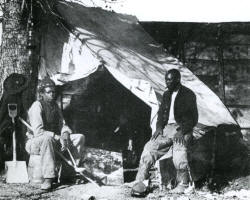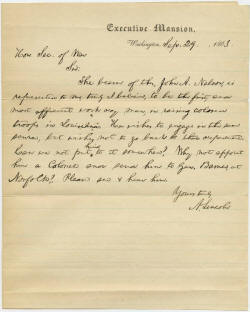|
ON LINCOLN'S MIND
 The ethics of recruiting black troops The ethics of recruiting black troops
 Send a link to a friend
Send a link to a friend
[October
26, 2013]
SPRINGFIELD -- With Nov. 19
marking the 150th anniversary of the Gettysburg Address, the Abraham
Lincoln Presidential Library and Museum is featuring letters to or
by Lincoln, written between the end of Battle of Gettysburg on July
3, 1863, and his famous speech at Gettysburg. Each letter represents
one of the many issues he had to face as chief executive of the
nation during its greatest crisis.
|
|
The official enlistment of African-Americans into the Union Army was
a new practice during the Civil War. Its novelty and need for
expediency sometimes clashed as overzealous or unscrupulous
recruiters pushed the boundaries of acceptable practice. Lincoln
appreciated the efficiency of his recruiters, as was evident in this
endorsement of John A. Nelson.

Abraham Lincoln to Edwin M. Stanton
Sept. 29, 1863
(Copy of letter transcript)
Executive Mansion,
Washington, Sep. 29., 1863.
Hon. Sec. of War
Sir:
The bearer of this,
John A. Nelson, is represented to me, truly I believe, to be the
first, and most efficient work day man, in raising colored troops in
Louisiana. He wishes to engage in the same service, but wishes not
to go back to that department. Can we not put him to it somewhere?
Why not appoint him a Colonel and send him to Gen. Barnes, at
Norfolk? Please see & hear him.
Yours truly
A. Lincoln
___

[to top of second column] |
 However, Nelson's efficiency also proved to be a significant
problem. He was not simply offering military jobs to runaways and
free blacks in the Deep South, but was forcibly impressing
African-Americans into service. Nelson's productivity surely made
his work appear effective to someone as far removed as Lincoln, but
it was also morally questionable at best or illegal at worst.
Nelson received his transfer but was soon dismissed by his
commanding officer for the same ruthless tactics he adopted in
Louisiana. Again, Lincoln defended the recruiter, but a military
examination proved Nelson's guilt and confirmed his dismissal.
Examples like Nelson's show the potential complications when men
who possibly viewed African-Americans as racially and intellectually
inferior supervised their recruitment. Lincoln's defense of Nelson
showed how the myriad responsibilities the president faced may have
obscured harsh realities on the ground.
___
To see one of only five copies of the Gettysburg Address in
Lincoln's hand and to receive a free booklet titled "On Lincoln's
Mind: Leading the Nation to the Gettysburg Address," containing this
and other document stories, visit the Abraham Lincoln Presidential
Library and Museum between Nov. 18 and 24.
[By the editors of the
Papers of
Abraham Lincoln. Text from file provided by the
Abraham
Lincoln Presidential Library and Museum
and received from the Illinois Historic
Preservation Agency] |